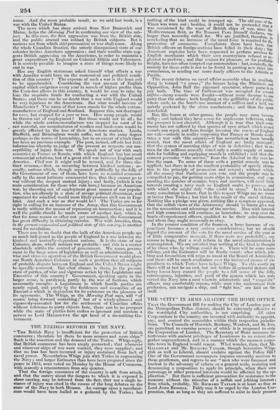THE NEEDED REFORM IN THE NAVY.
"THE British Navy is insufficient for the protection of British commerce ; therefore let there be more seamen and more ships." Such is the assertion and the demand of the Tories. Whigs reply, that British commerce has been amply protected ; that whenever and wherever ships of war were wanted, they were supplied ; and that no loss has been incurred or injury sustained from lack of naval power. Nevertheless Whigs join with Tories in augmenting the Navy ; and larger Estimates than have been prepared since the peace in 1815, were voted on Monday by the House of Commons, with scarcely a remonstrance from any quarter. That the foreign commerce of the country is safe from attack, and that the outcry about the dangers to which it is exposed is sheer canting, may be inferred from the fact, that not a single in- stance of injury was cited in the course of the long debates on the state of the Navy in both Houses. An outrage upon a merchant- man would have been hailed as a godsend by the Tories.; but
"•••••.. nothing of the kind could be trumped up. The old case of the Vixen was worn out : besides, it could not be pretended that it was occasioned by the want of British ships of war, since the Mediterranean fleet, as Sir Ronmer PEEL himself declares, was larger than necessity called for. We are justified, therefore, in concluding that no increase of the naval force is required for the protection of commerce. Complaints there have been, that British officers on foreign stations have failed in their duty ; that American captains have been requested to perform services for English mercluints which their own countrymen refused or ne• glected to perform ; and that cruises for pleasure, or for profitable freight, have too often tempted our commanders : but, assuredly, the remedy for these evils is not to be found in putting new ships into commission, or sending out more dandy officers to the Atlantic or Pacific.
The recent debates on naval affairs resemble what in pugilistic slang is termed "a cross ;" the boxers being the Ministers and Opposition, John Bull the pigeoned spectator, whose purse is to pay both. The time of Parliament was occupied for several nights—many rounds were fought—without more damage to one party than the other ; both laughing at the gullibility of the public, whose cash, to the handsome amount of a million and a half, was quietly pocketed by the sham combatants ; and thus the sport concluded.
But, like losers at other games, the people may soon become sulky : and indeed they have cause for unpleasant reflection, while the prospect is not cheerful. Although it is true that their coin. mace has not suffered by that species of open attack which armed vessels can repel, and from foreign invasion the coasts of England are safe—nobody in reality supposing that France or Russia inedi• taws a war with this country—it has nevertheless been broadly stated, that the naval affairs of England are badly managed ; that the system of manning ships of war is defective ; that in re- turn for the millions annually voted only a scanty supply of mate- rials for building and equipping vessel's is exhibited ; and that dis- content pervades "the service," from the Admiral to the man be- fore the mast. To some of these evils a partial remedy may be applied; but there is not the smallest probability of speedy altera- tion in the principle of promotion and reward ; without which, all the money that. Parliament can vote and the people may be compelled to pay, for putting more ships in commission, and ;mg- menting the number of seamen, boys, and marines, will avail little towards creating a navy such as England ought to possess, and with which she might defy " the world in arms." It is indeed sorry consolation to know, that in this respect Whigs arc no worse or better than Tories ; but that is the result of the naval debates, Nothing like a pledge was given, nothing like a symptom appeared, that the selfish views of the Aristocracy should in future give way to the necessities and advantage of the service. Men with interest and high connexions will continue, as heretofore, to step over the heads of experienced officers, qualified to be their schoolmasters, and whom they ought reverently to obey. In the present condition of the finances, a large increase of ex- penditure becomes a very serious consideration ; but we should regard the amount of the vote for the naval service of the year as of little comparative moment, if there were any probability, any reason to hope, that a real reform in the naval adm i
inistration s contemplated. We are satisfied that nothing of the kind is thought of by those who, by willing, could do it. There wilt be sonic more talking, and the Estimates wilt be finally voted: after which„job- bing and favouritism will reign as usual at the Board of Admiralty; and there will be much exultation over the increased means of ex- penditure to which Tories have helped Whigs. To this costly joy there will at last be an end, but not before disgraceful defeats and heavy losses have roused the people to a full sense of the folly, extravagance, injustice, and peril of the system which has con- verted the Navy into a nest wherein aristocratic and " exquisite" officers may comfortably repose, while men who understand their profession, can navigate a ship, and " fight her," are laid on the shelf.


























 Previous page
Previous page